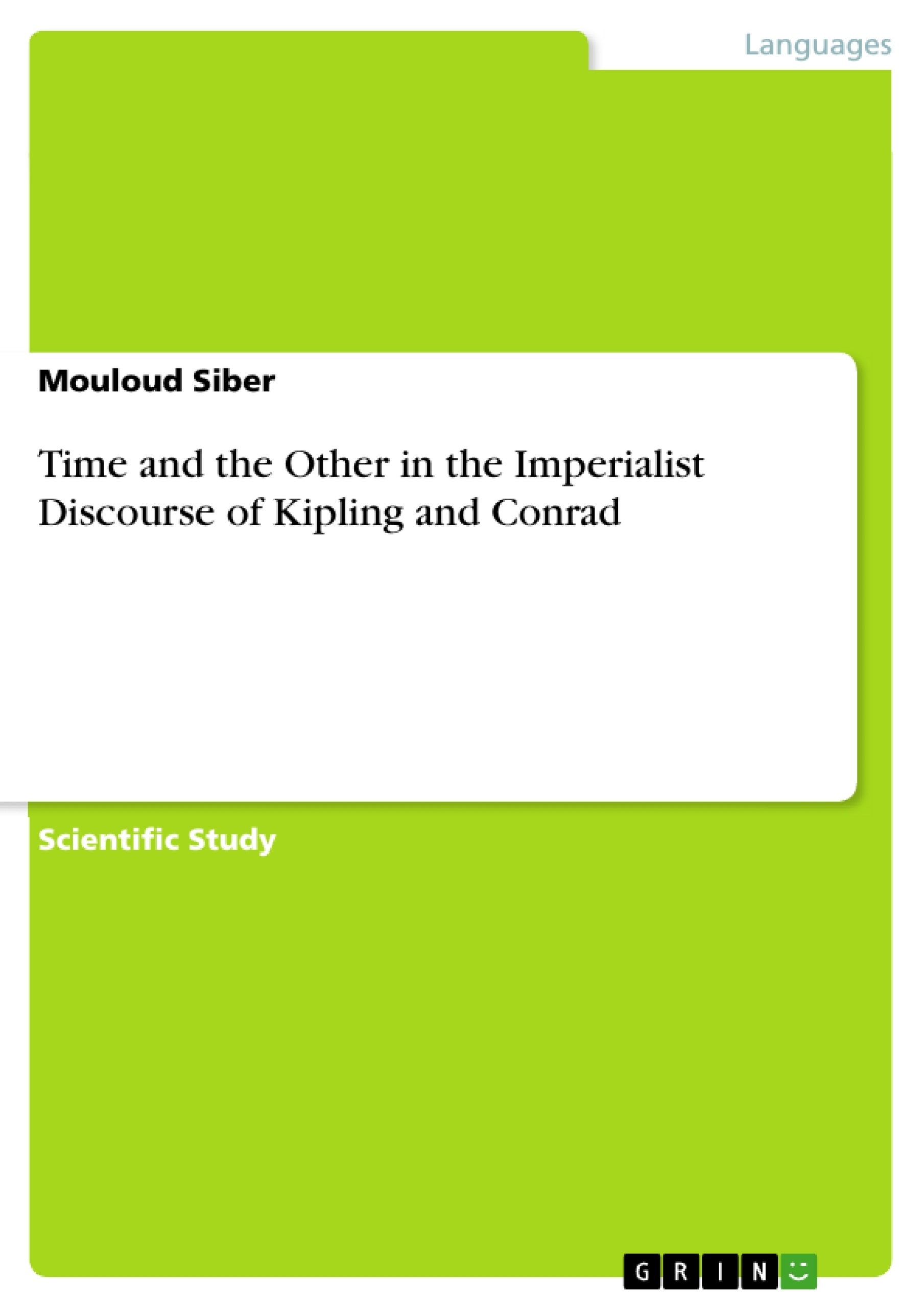This paper sheds light on the appropriation of the concept of time in the imperialist discourse of Joseph Conrad and Rudyard Kipling. Following a Saidian perspective, it shows that the writings of Joseph Conrad and Rudyard Kipling appropriate time as an ideological tool so as to provide primary support for the British Empire. They do this by the dichotomy they draw between the primitive time of the non-Western people and the evolutionary time of the Westerners. Both writers show that the non-Westerners, in view of their primitivism and the advancement of the Westerners, need the intervention of the latter so as to promote their progress. They make some polyphonic appeal to other disciplines so as to achieve this purpose. Consequently, they, for instance, weave their texts with the teachings of anthropology, biology and history, hence the importance they grant to the concept of time as it is viewed in evolutionary thought of the nineteenth century.
Inhaltsverzeichnis (Table of Contents)
- Introduction
- Issue and Working Hypothesis
- Discussion
Zielsetzung und Themenschwerpunkte (Objectives and Key Themes)
This paper aims to analyze the concept of time and its role in constructing the colonial "Other" in the works of Rudyard Kipling and Joseph Conrad. The study focuses on how these authors utilize time as a tool to justify imperial expansion and the European dominance over non-Western societies. The objective is to demonstrate how time is framed within a Darwinian perspective, highlighting the perceived evolutionary advancement of the West and the perceived stagnation of the East. The paper also examines the influence of ethnographic studies and the prevailing ideas of European superiority and racial hierarchy during the era of imperialism.
- The use of time as a tool to justify imperial expansion and the European dominance over non-Western societies
- The contrasting conceptions of time in Western and non-Western societies
- The influence of Darwinian evolutionary thought on the perception of time and the "Other"
- The impact of ethnographic studies on the construction of the "Other"
- The relationship between time and the colonial "Other" in the works of Rudyard Kipling and Joseph Conrad
Zusammenfassung der Kapitel (Chapter Summaries)
- Introduction: This section provides a brief overview of the colonial contact between the West and non-Western world in the 19th century. It highlights the role of canonical authors like Kipling and Conrad in representing this encounter and the emergence of postcolonial theory in response to their works. The introduction also mentions previous studies on Kipling and Conrad that have analyzed their colonial discourses and representations of the "Other."
- Issue and Working Hypothesis: This section outlines the research question of the paper, which examines the issue of time and the colonial "Other" in the writings of Kipling and Conrad. The working hypothesis proposes that both writers use time to justify imperial expansion and the European dominance over non-Western societies, contrasting a linear and evolutionary Western concept of time with a static and primitive non-Western conception. The section also draws upon the intellectual and geopolitical discourse of the colonial period, including the doctrine of paternalism and the notion of European civilizational superiority.
- Discussion: This section begins the analysis of Kipling's and Conrad's works. It explores how they construct a dichotomy between the Western "Self" and the colonial "Other" to justify imperialism. The section focuses on the authors' appropriation of the concept of time as a key tool to reinforce this dichotomy and establish the superiority of the West. It examines the contrasting conceptions of time in Kipling's Kim and how they are used to illustrate the "backwardness" of Indian society and the need for British intervention. The section also delves into Conrad's works, suggesting that he uses time to create a similar distinction between the Europeans and their "Others," portraying the latter as belonging to a static and unchanging past.
Schlüsselwörter (Keywords)
The keywords for this paper include colonial discourse, time, the "Other," Rudyard Kipling, Joseph Conrad, imperialism, Darwinian evolution, Orientalism, Edward Said, Johannes Fabian, and time perception.
Frequently Asked Questions
How is the concept of time used in imperialist discourse?
Authors like Kipling and Conrad used time as an ideological tool to create a dichotomy between "primitive" non-Westerners and "evolving" Westerners.
What is the "Saidian perspective" mentioned in the abstract?
It refers to Edward Said's theory of Orientalism, which analyzes how the West constructs and represents the "Other" to justify colonial dominance.
What role does Darwinian evolution play in these literary works?
The works are influenced by 19th-century evolutionary thought, portraying Western societies as advanced and non-Western societies as stuck in a primitive past.
How does Kipling's "Kim" illustrate the colonial view of time?
The novel uses contrasting conceptions of time to depict Indian society as "backward," thereby suggesting a need for British intervention and progress.
What disciplines influenced the writings of Conrad and Kipling?
Their texts are woven with teachings from anthropology, biology, and history, reflecting the scientific racism and civilizational hierarchy of their era.
- Citar trabajo
- Maitre Assistant Mouloud Siber (Autor), 2009, Time and the Other in the Imperialist Discourse of Kipling and Conrad , Múnich, GRIN Verlag, https://www.grin.com/document/137241



